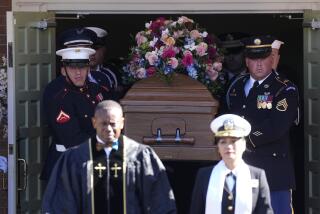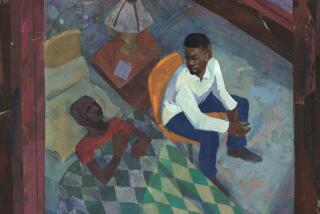Ronald Barrett dies at 66; studied blacks’ views of death and dying
- Share via
When his mother was dying in a hospital critical care unit, Ronald Barrett — a Loyola Marymount psychology professor specializing in African American death and dying issues — was told that she could have only two visitors at a time.
It’s a common rule, but one that Barrett believed insulted many African American families who feel it’s extremely important to gather in large numbers when a relative is near death. He bristled at the edict.
“I decided to pay it no mind,” he said in a 2002 interview with the Journal of Palliative Medicine. “I am tremendously grateful to the evening nursing staff for their sensitivity in allowing a collective of about 20 family members to gather in my mother’s hospital room during her final hours.”
The group quietly gathered around her bed, prayed, then left as to not disturb the unit. “When the death did occur,” he said, “we were tremendously relieved in feeling that we had been there.”
Barrett, 66, who advocated more sensitivity of cultural differences in dealing with death, died May 31 at St. John’s Health Center in Santa Monica. The cause was cancer, said his friend Claude Jay.
Barrett taught at Loyola for 36 years and was head of the psychology department from 2010 to 2014. Early in his career, he was drawn to his specialization.
“I became interested initially when I taught my first course in the field of death and dying,” he said in a 2009 interview recorded during an Assn. for Death Education and Counseling convention. “I was struck by the fact that there was so little research in the literature about African Americans.
Barrett traveled widely in Africa and the Caribbean to study the topic and wrote for several scholarly journals. He wrote that funerals are “primary rituals” for many in the African American community, with importance beyond paying respects to the dead.
“Funerals and funeral rites are important occasions to renew relational ties and mend social networks,” he wrote in an essay for the 2006 anthology “Death and Religion in a Changing World.”
Growing up, Barrett saw firsthand the importance of funerals among adults in his own family.
He was born Aug 17, 1948, in Brooklyn, N.Y., and grew up in Florence, S.C. “Growing up as a child within the black experience, funerals were very much a part of my life and my earliest memories,” he said in the journal interview. He was brought to his first traditional wake when he was about 6.
“The casketed remains were set up in the living room of someone’s house. I can vividly recall the emotions of that experience. I can also recall on many occasions my mother and grandparents having to leave us to travel great distances to go to funerals.”
The importance of the family as a collective unit can be misunderstood by doctors and others who want healthcare decisions made quickly. “Healthcare providers often do not appreciate that these important decisions cannot comfortably be made until the family gathers and everybody has made their views known,” he said in the interview.
Barrett also said that the long history of discrimination against African Americans can lead to distrust of medical institutions, and that in general, blacks are less likely to agree to cutting off life-sustaining treatment.
Except for a brother, Nathaniel, of Brooklyn, Barrett had no immediate survivors.
Traditions that had been so much a part of his study and writings were carried on by several friends when his own time came.
“On Saturday night, the night before he died, we gathered in his room,” Jay said. “The hospital chaplain came in and gave a Scripture, then we sang about seven or eight songs. His room was filled with song.
“The next morning, when he did pass, I looked back and thought, ‘What a time we had that evening.’ He was given quite a celebration.”
Twitter @davidcolker
More to Read
Start your day right
Sign up for Essential California for the L.A. Times biggest news, features and recommendations in your inbox six days a week.
You may occasionally receive promotional content from the Los Angeles Times.







